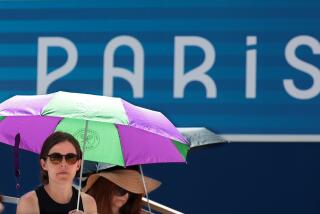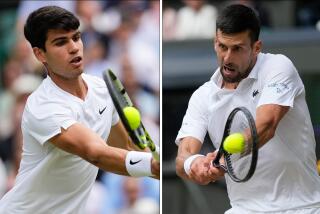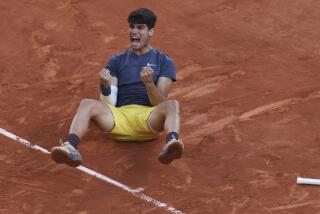Argentina Won’t Cry for Henman
- Share via
PARIS — It had been a run of delicious incongruity here, watching Tim Henman travel to a place no other British male had been during the Open era of tennis.
The man often called Timbledon -- who will be holding the rapt attention of the British public, serving and volleying, at Wimbledon later this month -- had been knocking clay off his shoes and knocking various clay-court experts out of the way at Roland Garros.
And, for a set and a half Friday at the French Open, Henman looked to be on his way to an even more incredible feat. He led the newly anointed King of Clay, Guillermo Coria of Argentina, by a set and a service break.
Suddenly, his weird, wild ride turned perilous.
Henman dropped 13 consecutive games. Then, just as Coria seemed ready to assume his place in the French final against his countryman Gaston Gaudio, Henman revived, won five consecutive games and served for the fourth set at 5-4.
Henman faltered at the edge, though, and lost the final four games. The No. 3-seeded Coria defeated No. 9 Henman, 3-6, 6-4, 6-0, 7-5, in 2 hours 47 minutes. He will face Gaudio in an all-Argentine final, a first for the nation.
Gaudio defeated another countryman, No. 8 David Nalbandian, 6-3, 7-6 (5), 6-0, in the other semifinal, rallying from a 1-5 deficit in the second set.
The Coria-Henman match had the greater marquee value. There was support for both from the French public. Fans gave Henman a loud ovation as he left the stadium, saluting his brave showing -- brave being the British word for close-but-not-quite.
Rain caused a short delay at the start of the match, which Henman joked about when he was asked if the slower conditions hurt his attacking game.
“I was concerned that I was going to get blamed for the weather here because I feel at times I get blamed for the weather at Wimbledon,” he said.
“You know, ‘ifs’ and ‘buts’ and ‘maybes,’ it really doesn’t interest me. He was better than me today, and that’s the bottom line.”
Henman had lost the first two sets in two of his other matches here and saved a match point in one. He had never gone past the third round at Roland Garros, but that seemed long forgotten.
Henman played nearly perfect tennis in the first set and a half, leading, 6-3, 4-2, hitting his forehand with pace and volleying with precision. His plan was a textbook in how to keep an opponent guessing. Coria was visibly unnerved, having not lost a set here before the semifinal.
When his service was broken at 30 in the eighth game of the first set, Coria smashed and broke his racket.
But when Henman’s level dipped, Coria took advantage.
“It’s the very fine line between obviously being very aggressive and very, very consistent,” Henman said. “My level dropped fractionally and then that gave him a chance to pick up his level. I got a little bit caught when I felt like I’d started to miss a few shots.... When you’ve lost a run of games, it’s very difficult to tell yourself to take more risks because you want to turn things around.”
Coria said he simply was not hitting the ball deep enough until the middle of the second set.
“He deserved to win the first set,” Coria said. “If I hadn’t changed the way I was playing, he probably would have won the second set and the whole match, in fact.”
Unlike his opponent in the final, Coria carries a reputation. Gaudio will attempt to become the first unseeded player to win the French Open since Gustavo Kuerten of Brazil in 1997.
After beating Nalbandian, Gaudio broke down in tears as he sat in his courtside chair.
“I was thinking about all the effort that I have made, when I was a kid and all the dreams I got when I was playing tennis, I was thinking to be in the finals of the French Open,” Gaudio said. “And now I am.”
The Gaudio-Nalbandian semifinal was hit with a bit of quirky controversy. In the second-set tiebreaker, Gaudio, leading, 5-2, was allowed to serve to the wrong side. Neither player nor chair umpire Andreas Egli realized anything was wrong until after Gaudio won the point.
Egli properly ruled that the point stood and that the next one would be played from the correct side. Nalbandian objected and suggested that the umpire be changed. His request was rejected by the supervisor of umpires.
Nalbandian, who said he was suffering from a rib injury, said the umpire made “a very big mistake, like both of us.”
Gaudio, however, recognized a bigger meaning in the moment.
“I mean, I made history, you know,” he said of the error. “It’s the first time it happened, something like that, in the French Open.”
He could have been talking about himself and Coria.
*
AT A GLANCE
Today’s women’s final
* No. 6 Anastasia Myskina vs.
No. 9 Elena Dementieva
Sunday’s men’s final
* No. 3 Guillermo Coria vs.
Gaston Gaudio
Head-to-head: Coria leads, 3-1
2001: Vina del Mar, clay, final, Coria, 4-6, 6-2, 7-5.
2001: Buenos Aires, clay,
quarterfinal, Gaudio, 6-3, 7-6 (6).
2003: Buenos Aires, clay, semifinal, Coria, 6-3, 1-6, 6-3.
2003: Hamburg, clay, semifinal,
Coria, 6-3, 6-7 (3), 6-0.
More to Read
Go beyond the scoreboard
Get the latest on L.A.'s teams in the daily Sports Report newsletter.
You may occasionally receive promotional content from the Los Angeles Times.











